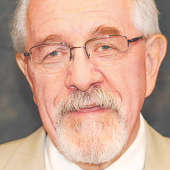- Christmas shopping is done, presents wrapped, strings attached? (12/14/16)
- Cecil is dead and human lives are threatened every day (8/12/15)
- As state flags go, Nebraska's ranks 50th (7/8/15)
- When everything looks like a nail (4/29/15)
- Who remembers to coal slurry pipeline debate? (3/11/15)
- More revelations in Department of Corrections mess (12/17/14)
- The Legislature becomes more Republican (11/19/14)
Opinion
Lawmakers consider additional educational choice
Wednesday, February 26, 2014
As a kid growing up in small town Nebraska I went to the elementary school closest to my house, the only junior high school and the only high school in town. I had many of the same teachers as my older siblings. I ate the same, one--choice meal as my classmates, and I liked it. Because there wasn't any choice.
My hometown now has four public elementary schools and several parochial schools. School lunch menus have evolved and students now have the choice of several entrees, some of them even healthy. Curriculum has changed and students are categorized as gifted, ordinary or in need of help. Home schools, parochial schools, magnet schools with emphasis ranging from arts to zoos, are all available now. In some places, students are sent to schools focused on discipline or special needs.
But nowhere in Nebraska can one find charter schools, a 22-year-old concept started in Minnesota and touted by proponents as innovative public schools designed to deliver programs tailored to the needs of the communities they serve. They are called the fastest and most successful growing reforms in the country.
Nebraska is one of eight states that don't allow charter schools, but Sen. Scott Lautenbaugh of Omaha has introduced a bill (LB972) to allow for the creation of up to five charter schools in the Omaha Public School District through a pilot program. It's nearly the same as his bill (LB593) that was heard a year ago by the Legislature's Education Committee and killed 8-0. Lautenbaugh says he tweaked this new bill to reflect the latest best practices.
Lautenbaugh and other proponents says charter schools are becoming popular -- there are now 5,453 charter schools serving 1.7 million students in 39 states and the District of Columbia -- as public schools are being criticized because of declining quality. Charter schools are funded with public money but operate independently of a school board. He said charter schools could adapt more quickly to new practices and to the needs of their students. It's all about giving students and their parents more choices.
Among the eight opponents at the hearing on last year's bill was then-Department of Education Director Roger Breed, who cited a 2013 study by the Center for Research on Education Outcomes at Stanford University that found charter schools generally do no better at raising student achievement than other schools. Breed said the bill (LB593) was a flawed bill delivering a flawed solution.
Proponents cite the same study and say it's positive because results indicate that 25 percent of charter schools outperform comparative traditional public schools, while 19 percent produced worse results. In math, 29 percent of charter schools outperformed the traditional public schools and 31 percent were weaker, according to the report.
Laughtenbaugh and four others testified in support of last year's bill. Breed and seven others -- representing the state's teachers, school boards, school administrators and parent teacher associations -- spoke against the measure. The same lineup can be anticipated this year as well.
Opponents say they worry about accountability to the public and to parents and to the students. Some say they worry about the perception that officials are just throwing up their hands and giving up on the public school system.
Proponents say that Nebraska's status quo of open enrollment and school choice just isn't enough and that it wouldn't hurt Nebraska to at least try another innovative approach. Charter schools, they say, are smaller and embrace the parents and community in which they are located to help support the school and its goals. Charter schools are public schools and are funded according to enrollment. Nationwide, on average, they are funded at less than 70 percent of the district per student amount.
That cost factor alone, if proven to be true and applicable in Nebraska, could be a compelling argument in a year when the Executive Branch is working ever harder to convince the Legislative Branch that it's all about tax cuts.
Lautenbaugh is to be commended for pushing ahead with the issue despite the unanimous death of it a year ago. But new ideas take time and study in Nebraska. Charter schools would be a good candidate for an interim study with proponents tasked to find successful charter schools in other states that would be comparable to specific Nebraska communities, not just Omaha.
If the kids at Lincoln Heights Elementary in Scottsbluff have a choice to eat something other than fish sticks on Friday these days, maybe their parents should be allowed to send them to a charter school if the choice is ever approved in Nebraska.

